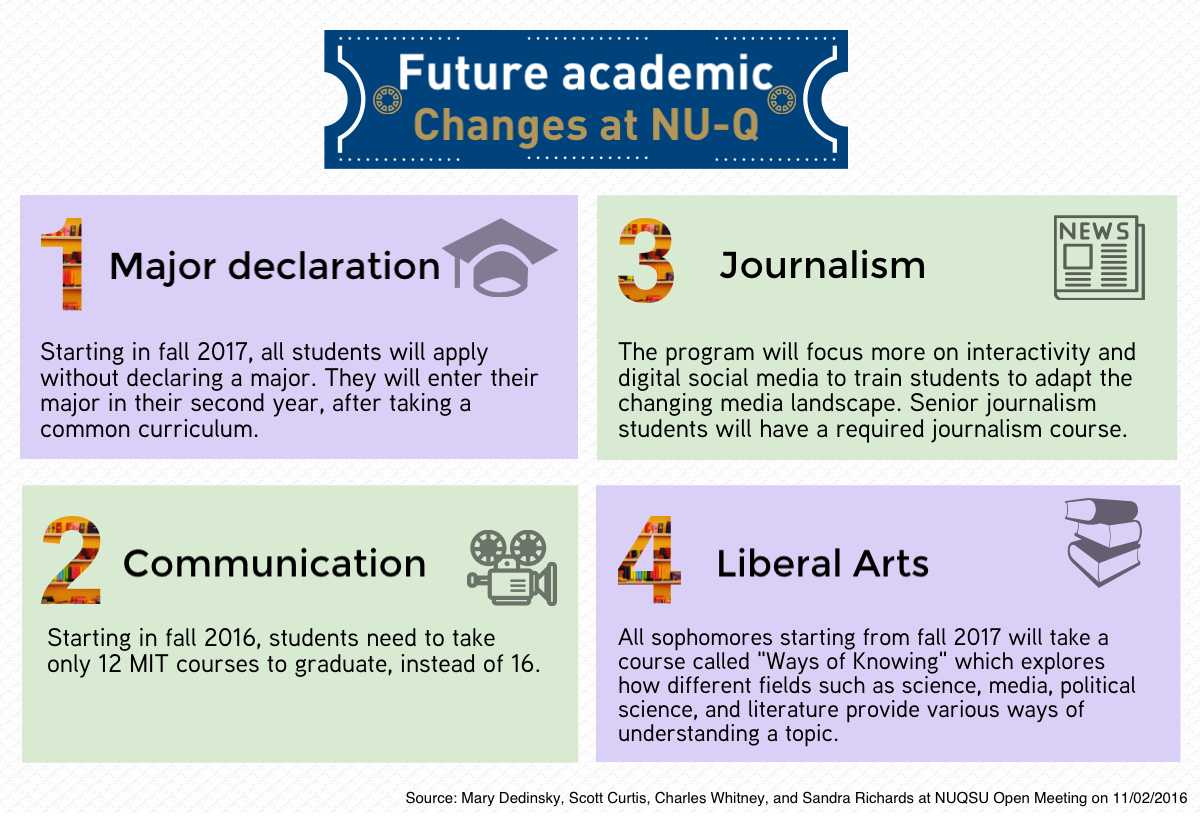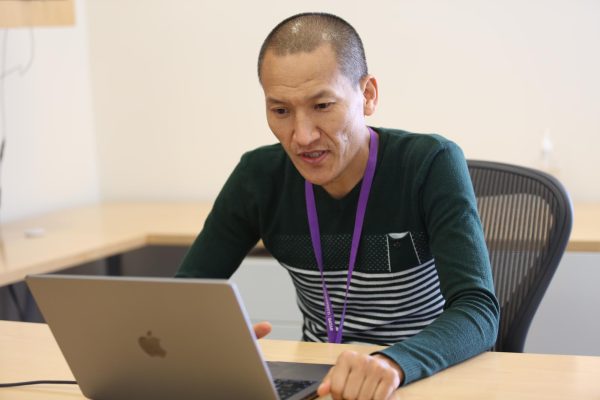Changes in Major Declaration Policy and Academic Curriculum Announced at the NUQSU Open Meeting

Beginning in fall 2017, all students will apply to Northwestern University in Qatar without declaring a major, said Charles Whitney, the associate dean at Northwestern University in Qatar, at the NUQSU open meeting three weeks ago.
Major academic curriculum changes in both journalism and communication programs were also announced. Communication students enrolling in fall 2016 will take only 12 MIT courses instead of the current 16 to graduate, according to Scott Curtis, the director of the communication program at NU-Q.
Meanwhile, the journalism program will focus more on contemporary digital platforms, and journalism seniors will have a required journalism course unlike now, according to Mary Dedinsky, the director of the journalism program at NU-Q.
Major declaration policy change
NU-Q has decided to admit future freshmen without have them declare a major initially because the faculty realized that journalism and other media industries are converging, according to Whitney.
“Journalists, strategic communicators, other media producers are all producing content on the same digital platforms and that many of the older boundaries between information and entertainment are becoming more fluid,” he said.
For the whole year, all freshmen will take the same exact courses except for their different choices in two required liberal arts courses, but they will have to declare their major in the spring semester. They will begin taking their specific major courses in sophomore year.
Whitney clarified that fall 2016 “students had the option to apply as journalism or communication majors, or to apply as ‘undeclared.’ Those who are admitted as undeclared will declare a major during the spring 2017 semester.”
Seventeen percent of the incoming freshmen selected the option to remain undeclared , which was least popular option among the three, according to Leon Braswell, the director of admissions at NU-Q.
Student reaction
Overall, many students seem happy about the change.
“I like the fact that students don’t have to choose majors from the start, for the sole reason that communication and journalism have a lot to learn from each other, especially in terms of storytelling. So this could be a way of broadening our horizons,” said Amaal Ali, a communication sophomore.
“I think it’s good to be able to experience both before having to declare your major. Until you fully experience the major, you can never be fully sure whether you want it or not. I hope that NU-Q can provide the right resources to facilitate students in making a final decision, such as helping them understand their own strengths and passions, as well as weaknesses,” said Urooj Azmi, a communication junior.
“I think it’s a wise decision to let people choose their major after their first year. We have had so many transfers in the past and it’s just a waste of time, both for students and the professors. It’s common logic to let students explore their interests before putting them into a major,” said Shakeeb Asrar, a journalism junior.
Some students think otherwise.
“Personally, I would not really like being “undeclared” for a year. I would want to be declared from the first day I start just because I have a strong idea of what I want to do,” said Menna Azzam, a freshman communication student.
Changes in MIT courses requirement
The struggle of some communication students to fulfill the requirement of taking 16 MIT courses in order to graduate brought practical changes, said Curtis.
He said the current high number of required MIT courses, “eliminates the amount of the choices you have putting together choices for your major. You just have to click things off the box, without given the opportunity to think about how these courses fit together.”
“ We would like to give direction, focus, and purpose to the communications major. One way to do that is to eliminate the requirements,” he added.
By reducing the number of required MIT courses, students will have more flexibility in designing their communication major. The community faculty will provide a number of different modules of courses to offer guidance, but the final choices are for students to make.
“It’s like making a major within a major. That’s the idea behind [it],” said Curtis.
This new change will apply for new students starting in fall 2016. Current students are still bound to the catalog requirements that were in force during the year they entered the program.
However, students are free to adopt the requirements of the new catalog, but they will have to fulfill all requirements of the new catalog. Mixing and matching will not be allowed. In practical terms that means too graduate on time, most students should continue with their current catalog, Curtis said. However, he advised students to consult with academic advisors.
Student reaction
Many students welcomed this new change to the communication curriculum.
“This is great for many students actually because I feel like a lot of them have yet to find what they are most interested in. So, more room for other courses, more room for students to find what they are interested in. I’d prefer the flexibility,” said Mohamad Zaki Hussain, a communication sophomore.
“I feel the change is good because it frees students up to take more classes that they are interested in which will ultimately help them prepare more for what they want to do in professional life,” said James Farmer, a communication junior.
One student wished this change had come sooner.
“I’m angry they’re only doing this now, not when we were there,” said Maryam Althani, a communication senior.
Changes in journalism curriculum
The journalism program is upgrading its courses to address the changing media landscape, according to Dedinsky. “We will deal with much more interactivity, digital social media, and whatever the new buzz area will be in the next few years,” she said.
She added that journalism seniors will have a required “capstone course.” Furthermore, instead of teaching a full 14 or 15 weeks for a single subject, the department is looking into conceptualizing each semester as a unit that will incorporate three different subjects for five weeks each. This way, journalism students will be able to quickly catch up with latest skills by bringing in short-term lecturers and experts from abroad.
Student reaction
“I’m happy about the inclusion of more new journalism courses, as I think we have some catching up to do in graphic design, content management and curation, and platform design. However, I would hope these skills are taught before students go on journalism residency,” said Ralph Martins, a journalism senior.
“The current Medill [School of Journalism] curriculum offered at NU-Q offers us a thorough understanding of the basics, but is limiting in that it doesn’t equip us with other necessary tools that would make us stand out in a candidate pool for a job. I’ve always been a proponent of a change in curriculum, just because there are so many digital tools out there that we are not exposed to. I know that a lot of this is self-taught, and hands-on, but a move towards a more digital-based curriculum would definitely give us a nudge in the right direction,” said Chantelle D’mello, a journalism junior.
Liberal arts change
Lastly, starting from fall 2017, all sophomores will take a new liberal arts course called “Ways of Knowing,” said Sandra Richards, the director of the liberal arts program at NU-Q. It will be a thematic course that explores how multiple fields such as science, media, political science, and other academic disciplines offer various ways of understanding a certain topic like global warming.












